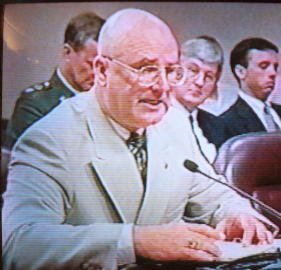
WHERE ARE OUR POWS? ... PAX Television 1/11/02
 |
|
WHERE ARE OUR POWS? ... PAX Television 1/11/02 |
| ORBACH: On Friday September 17, 1996 Congressman Robert Dornan Chairman of the subcommittee on military personnel of the House National Security Committee, held a hearing on the POW/MIA issue. |
 |
| Among those testifying were retired Colonel Phillip Corso ( US Army Ret.), now deceased. Corso was a former National Security Aide and POW specialist to President Eisenhower. Col. Corso was present during the exchange of prisoners at Panmunjom in Korea at the end of the war. Incredibly, his previous attempts to tell our government about what happened to Americans there were ignored. |
  |
| CORSO: Five hundred of our prisoners, our estimate was, were not returned that we knew were sick and wounded and seriously ill or wounded and will not survive unless they are brought back soon for treatment. As we had our staff meetings with the chief of staff and so forth I was briefed on the subject. I would brief my superiors on this and then the position was to compile this information in the form to send to Washington, to the Pentagon. Nothing was done in the Far East with this information. It was sent back to Washington for processing or instructions. But, generally, we never got any instructions back to do anything about it. |
| ORBACH: If Congress knew that 500 American prisoners were left behind, why was nothing done to bring them home? But Colonel Corso’s story gets even darker as he spoke of his first hand knowledge of many taken to the former Soviet Union. Information he had personally shared with President Eisenhower himself. |
| CORSO: Prisoners had not been returned from North Korea and had been sent in fact to the Soviet Union. |
| ORBACH: Are former top level officials making all of this up? |
  |
| Until recently, official US policy was firmly rooted in the statement: |
| "We have been unable to prove the speculation that
American POW’s were transferred to the former Soviet Union."
Robert Jones Former Assistant Secretary of Defense In a letter to Senator Lieberman |
| ORBACH: But then in June 2001, at a National Alliance of Families forum, Maj. General Roland Lajoie (U.S. Army Ret.), Chairman of the American side of the US-Russia Joint Commission, unexpectedly admitted the truth for the first time. |
   |
| LAJOIE: Of the thousands of American prisoners that unfortunately fell into Soviet Custody from the Nazi years, and for the most part were eventually repatriated, and a lot of those too were deaths, a certain number never made it back. |
| ORBACH: Against all odds and opposition, the families of POW’s have continued their search for loved ones lost in America’s wars. Some have been searching for 50 years. Are their efforts finally paying off? A source in the Pentagon recently told Bob Dumas that they are now working on the live American POW issue. But that persistent question still remains. Why? Why is the American government apparently willing even eager to avoid any confrontation over POW’s who are still alive? Why did the Air Force literally bury the crew of ADLID? What are we afraid of? In short, why is this mystery still unexplained? |